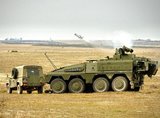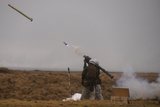Turkey’s latest IFV takes shape as key subsystems revealed
First deliveries of the SARP 100/35 remote-controlled turret (RCT) for Altuğ, developed as a private venture by Aselsan, will be made in 2027.
BAE Systems and Portendo AB have signed an agreement to co-operate on civil and military detection systems for improvised explosive devices (IEDs).
The agreement means that BAE Systems obtains an exclusive license to market, sell and manufacture Portendo’s P.Eye-S in the United States and Canada, for the civil market. The P.Eye-S is Portendo’s first product for remote detection of explosives, providing safer working conditions for security personnel at airports, military establishments, government buildings and other potential targets.
The agreement also covers the development of a military detection system for roadside bombs based on this technology. It will, under a separate license agreement, be manufactured and sold exclusively by BAE Systems.
This technology can be adapted to vehicle-mounted weapons and sensor systems, such as BAE Systems’ Lemur, helping troops to secure an area and clear concealed explosives from a safe distance.
“We have worked with several different initiatives for countering the improvised explosive device threat and the Portendo equipment is technologically ground breaking. This agreement will ensure that technologies developed in support of the war against terrorism are exploited in the most efficient way,” said Ulf Einefors, head of business development for BAE Systems Weapons.
“Our system has a great potential in the homeland security market in the US and Canada and, with further development, for IED clearance on military operations. With its vast experience in the defence market, BAE Systems is an ideal partner for us when it comes to development and marketing of such products,” said Portendo CEO Gunilla Savring.
Source: BAE Systems

First deliveries of the SARP 100/35 remote-controlled turret (RCT) for Altuğ, developed as a private venture by Aselsan, will be made in 2027.

Companies are turning to rapidly advancing technologies such as artificial intelligence (AI) and machine-learning (ML) to to reduce maintenance times and costs and increase operational hours and tempo.

Australia has received approval to buy Javelin Lightweight Command Launch Units (LwCLU) on the same day as the British Army announced the first firing from a Boxer armoured vehicle, a sign of the continuing interest in the weapon. Billons-of-dollars of Javelin missiles and systems have been ordered in the past two years.

A final decision on the siting of an Australian Weapons Manufacturing Complex (AMWC), which will produce all-up GMLRS (Guided Multiple Launch Rocket System) rounds, will be made by the Australian Department of Defence (DoD).

An agreement has been signed that will extend Stinger missile system production to Europe with Diehl Defence currently looking at manufacturing locations.

The first of the Altay T1 Main Battle Tanks (MBTs) will have a South Korean power pack while later Altay T2s will be fitted with the locally made BMC BATU engine.